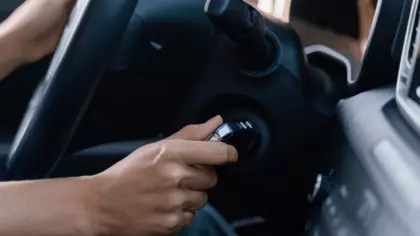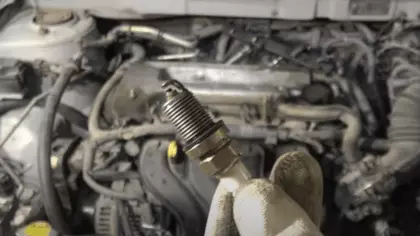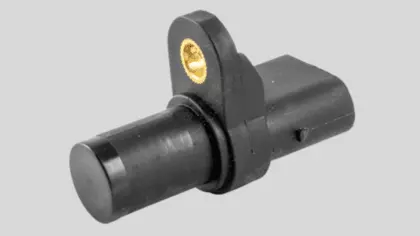Hearing the engine crank for too long is panic-inducing; however, the purr under the bonnet relieves it. Though the engine will eventually start and run fine, you shouldn’t ignore it if the car cranks too long before starting.
Instead, you should diagnose the root of the problem and fix it accordingly to avoid expensive repairs and annoying experiences. Read on to understand why cars crank too long before starting, along with possible solutions.
Why Does Car Crank Too Long Before Starting

The car engine may crank for a long time before starting for a variety of reasons, including engine failure or poor vehicle maintenance. Even mechanical issues or low-quality gas can cause this error.
Below is a list of the reasons responsible for this issue with quick solutions
| Problems | Solutions |
| Dirty or faulty air flow sensor | Clean the dirty MAF sensor |
| Weak fuel pump | Replace the fuel pump |
| Weak coolant temperature sensor | Replace the coolant temperature Sensor |
| Dying battery | Repair or replace the battery |
| Faulty starter | Repair the starter |
| Damage spark plugs | Change the damage spark plugs periodically |
| Poor fuel pressure regulator | Replace the fuel pressure regulator |
| Worn-out spark plug seal | Replace the spark plug tube and valve gasket |
| Defective crankshaft position sensor | Replace the sensor |
| Dirty fuel filter | Change the fuel filter |
| A failed fuel injector | Replace the fuel injector |
How Long Should a Car Crank Before Starting?
It is dependent on the car and a variety of factors such as the weather, the carburetor, and how well you maintained it.
In general, a car should start immediately after engaging the starter. It means that most modern fuel-injected cars should crank for 1 or 2 seconds before starting in warm weather. However, in the winter, the engine can take three to four seconds. If it cranks more than that, diagnose the engine with an expert mechanic to figure out the reason.
In addition, an older car with a carburetor may take 5 seconds in warm weather, while you may need to wait up to 15 seconds in winter to start the engine.
In terms of the type of car, the most modern and well-maintained LPG, gasoline, or CNG-powered car should start quickly, particularly if the engine isn’t freezing cold. It means the cars should start within 5 seconds of cranking, while cold weather may make it hard to start.
However, the diesel-powered engine can bring different scenarios. In warm weather, they may start normally, but in cold weather, they may crank too long.
The reason is that diesel fuel isn’t as volatile as gasoline and can gel in cold temperatures. Hence, diesel engines require block heaters, intake air heaters, fuel heaters, dual batteries, or anti-gel additives during the winter season and may still struggle to start.
Most Potential Reasons and Solutions of Car Cranks Too Long Before Starting
Though the list is too long, below is the most common reason that forces the engine to crank too long before starting:
Dirty or Faulty Air Flow Sensor
The mass air flow sensor controls the amount of air that enters the engine. If it gets damaged or dirty, the engine might not get enough air, which can cause insufficient fuel spray in the engine. As a result, you may experience a difficult engine start or excessive cranking. A lean condition is the most common indication of this error.
Solution
Cleaning the dirty MAF sensor can solve this problem. To do so, turn off the engine, remove the battery, and pull off the air filter using a wrench. Once removed, place the MAF sensor on a fresh towel and clean it thoroughly using a manufacturer’s recommended cleaner. Once done, leave the sensor for a few days so it can dry completely. After that, reinstall it.
Weak Fuel Pump
The fuel pump plays a great role in letting the fuel move from the gas tank to the fuel rail to ensure proper pumping through the motor. But a faulty pump can disturb this system by delivering an insufficient amount of fuel to the engine. As a result, the engine lacks sufficient power to start the vehicle smoothly, resulting in a long crank.
Solution
If the fuel pump gets damaged, you have to replace it immediately. Otherwise, it can cause severe damage to the engine.
Weak Coolant Temperature Sensor
This component measures the coolant temperature and may deliver the wrong signal to the computer if it gets bad. This incorrect signal can disrupt the air-fuel ratio, resulting in long cranking before starting or even preventing the engine from starting.
Solution
The only way to solve this problem is to replace the damaged coolant temperature sensor.
Dying Battery
A weak battery causes slow engine cranking and visible dimming. It can also cause sudden battery failure. In addition, the engine can crank too long before starting due to a poor battery terminal connection.
Solution
An easy and quick way to rule out this problem is to have a helper jam the large screwdriver tip into the void between every cable clamp and battery terminal while trying to start the engine.
If you notice the cranking is improving, it means there is a problem with the connection. To fix this problem, you can take your car to a heads-up auto parts store.
Note: This troubleshooting won’t work with side-terminal batteries.
Faulty Starter
Your car can also crank too long before starting due to a bad starter. Unfortunately, many car drivers snack on an inoperative starter using a heavy object, which only increases the amount of the penalty.
Solutions
To determine if the faulty starter is causing the error, open the door and check the dome light’s brightness while trying to start the engine. If the light doesn’t get slightly brighter, the battery and its cable connection are okay, but the starter gets damaged.
In this case, check the charging system if it’s not doing the job properly due to a loose drives belt, a faulty part, or a poor connection. And then fix the part accordingly.
Damage Spark Plugs
A faulty spark plug can produce a weak spark, which reduces the power in the ignition. Because of the insufficient power, the spark plug can’t offer a powerful zap to ignite the fuel mixture properly. Hence, the engine might not start or may start after much cranking.
The spark plug can wear out due to overheating, carbon buildup, and an inaccurate spark plug gap. The symptoms of worn spark plugs are a rough idle, poor engine performance, noisy exhaust sounds, and weak acceleration.

Solution
Typically, spark plugs need to endure excessive heat regularly and may wear out over time, even if they are quite durable. Hence, its best practice to replace the spark plug at certain internals. In this case, you can contact AutoZone or hire an expert mechanic.
Poor Fuel Pressure Regulator
This component adjusts the fuel pressure during various engine loads. But a fuel pressure regulator can get damaged due to a faulty diaphragm and can increase the fuel flow into the intake manifold via vacuum lines.
At times, the engine can crank too long before starting. A bad or leaky regulator can cause various issues with the fuel’s injection, including up or down pressure. The common signs of low fuel pressure are a reduction in power, fuel leaks, black spark plugs, smoke from the exhaust, and reduced fuel mileage.
Solution
If so, you have to replace the damaged fuel pressure regulator.
Worn-out Spark Plug Seal
There is a seal on the spark plug tube that prevents oil from entering the tube. If this seal is worn out, then the oil can leak into the tube and pollute the coil and the tube itself. As a result, the engine can cause a misfire, a hard start, or even not start.
Solution
If the spark plug seals are worn out, you have to replace them. You should also replace the valve cover gasket to avoid further issues.
Defective Crankshaft Position Sensor

This vital part of the timing system delivers signals to the computer. It also controls the crankshaft’s rotational speed and position. If the engine can’t find the place of the crankshaft’s rotation, it may fail to activate the fuel injectors and sparks. As a result, your vehicle may crank for an extended period of time before starting or stalling.
Solution
Replace the bad sensor. To do so, pull out the faulty sensor using a socket wrench. Then insert the new sensor and secure it.
Dirty Fuel Filter
If your car cranks for an extended period of time before starting, it means your fuel filter is dirty. In general, car engines need more fuel to keep running during starting. A dirty fuel filter limits the fuel flow and reduces the fuel pressure. As a result, it causes lean conditions as well as excessive cranking during starting.
Solution
If the polluted oil filter is the source of the problem, replace it to avoid an annoying situation. To do this, set a drain pan under the drain plug underneath your car and unplug the plug to drain the existing oil. Then change the oil filter.
A Failed Fuel Injector
Are you particularly experiencing a long crank time when the engine is cold? Possibly the fuel injector leaked oil due to the worn-out O ring. The o-ring can get damaged easily due to the engine heat. Fuel injectors can also fail because of clogging, leaky seals, or poor maintenance.
A clogged fuel injector can’t fire at the proper time and may create a disturbing pattern of fuel release. As a result, the engine delays turning on and starting up until it gets enough fuel.
To determine if the fuel injector gets dirty, place the screwdriver’s metal end on the injector and place your ear next to the other end. You should hear continuous, rhythmic clicking if the injector is okay. Apply these tricks to all injectors to identify the faulty one that doesn’t create clicking.
Solution
Once you find the faulty fuel injector, replace it. You should check the fuel injector on a regular basis and clean its dirt buildup to increase the longevity of this part.
How Do You Fix a Car That Cranks Too Long?
Don’t ignore it if your car cranks too long before starting. The longer you wait, the worse the problem will become and the more expensive the repairs will be. In this case, it’ll be best to take the car to an expert automobile shop.
If you are concerned about the money, find a mechanic friend who can help you out. However, don’t hire a person who isn’t a qualified mechanic. Apart from the solutions to certain problems we mentioned above, you can try these quick and simple attempts as well.
Cycling the key
Cycling the key a few times is the easiest and quickest test. If the engine starts quickly, it is because the fuel pump has a leak and the fuel pressure in the lines has dropped.
Scan Tool
Get access to a scan tool and check if the cam sensor is functioning properly or not. The can sensor will indicate the location of the number one cylinder, allowing for a faster start. You can also find out the number 1 cylinders by considering the crank sensor as a reference point.
Once you know where it is, you can inspect it and make an informed decision. However, it’ll be difficult for you to perform these tests if you aren’t an automotive technician.
Prime the Fuel System
Try to start the car without cranking the engine. Instead, rotate the key through the run position for around 5 seconds. Then rotate the key to the off position for another 5 seconds. Repeat this process 3 to 5 times.
Once done, finally crank the engine to start. This process is known as priming the fuel system. If you notice the engine starts quickly, it means fuel is draining back into the tank after you turn off the engine. It’s happening due to the bad fuel pump.
Obviously, there are numerous factors that can cause your engine to take longer to start. Hence, it’s better to let an expert mechanic diagnose the actual problem and fix it accordingly.
FAQs
1. Why Car does struggles to start but runs fine?
Your car may struggle to start but run fine due to plenty of reasons, including battery health, wreathing condition, fuel pump health, and wiring issues.
2. Why is your car not starting immediately?
If your car is delayed in starting, it means the battery is dead or dying. Loose connection cables or poor alternators can also cause this error.
3. Why does my car take 3 tries to start?
If all the electrical parts are okay, but your car still takes a few attempts to start, it means the ignition system is the real culprit. Even sometimes, dirty or jammed fuel injectors, and mass air flow sensors can also be the source of the problem.
Final Words
If you notice your car cranks too long before starting, don’t ignore it even if it runs in fines. You don’t know what will happen the next time when you are in the middle of the trip or need to catch a flight immediately. Instead, do some troubleshooting to determine the root of the source and fix it accordingly, particularly if you have skill in it. Otherwise, take the car to an automotive shop to fix the problem at minimal cost and avoid further severe damage.

